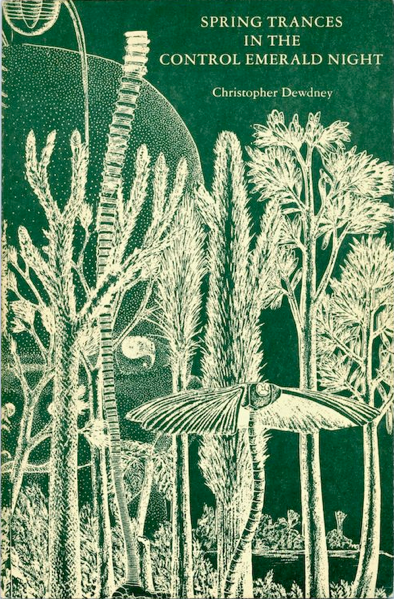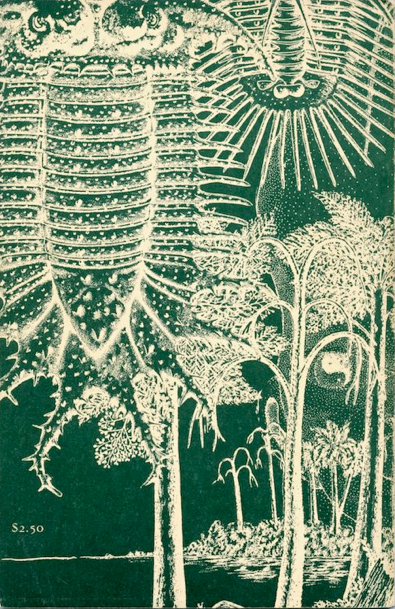Walking With Christopher Dewdney
BY Brian Lucas

I have never been to Ontario. My only experience with Canada occurred a couple decades ago: we drove from Hemet, California to Victoria, British Columbia in a Ford Bronco. I remember seeing a famous Canadian’s house from atop a red double decker bus. I wore a Captain America sweatshirt without irony. A couple years later, I told a boy in grade school I was Canadian. I thought one could just choose to be Canadian.
That’s my personal association with Canada. And Canada has nothing to do with the following, except for the Natural History of Southwestern Ontario, which Christopher Dewdney has written over the course of well over twenty years. The slim sliver I will herein riff and scribble through, Spring Trances in the Control Emerald Night (The Figures, 1978), is the first installment. Written in the spring of 1974 by a twenty-three-year-old young man who was hatched in a Cenozoic asylum, Spring Trances is exactly that and more. The Cenozoic era runs through his poems, the flora and fauna speaking in various tongues throughout. Many consider A Natural History to be the Canadian Patterson. While it is truly an epic poem, I consider it more on par with Ronald Johnson’s Ark in terms of vision. The ecstatic is center point. This is a modern epic too few have ever heard of, let alone read. Among my immediate circle of poetry-interested friends, I sadly know of only two people who have read Dewdney’s work. Maybe I need to get out more? Nah.
I think I first came across the name of Christopher Dewdney in an interview with Clark Coolidge, where he mentioned digging Dewdney’s work. I could be wrong: apologies to Clark and Christopher if so. Anyhow, Clark also mentioned the poet John Godfrey in an interview which led me to reading his work. Both John and Christopher have a certain type of unvarnished and unabashed sensuality and are keen observer/filters of what is in their midst, albeit one is wholly urban, while the other is immersed in sonar and leaf. But that tangent has little to do with the following.
Christopher Dewdney’s brain was immaculately conceived in Ontario.
I fantasize a meeting between Christopher Dewdney and a horseshoe crab. Perhaps a picnic atop an alluvial plain where black muck is served to headless guests whose collective belief system centers on a figment of vertiginous rain. Or an intimacy with sudden changes in atmospheric pressure.
The shores strewn with the skeletons of salmon mid-copulation. The waves inhabited by blind surfers. Green cathedrals mist chrome in light afternoon. The controlled emerald night of sound rings out onto grassy inclines that mask a process of erosion that occasionally bubbles up into Dewdney’s poems. A radiant inventory of phenomena that begs for classification yet eludes category. Taxonomic nightmare.
I see Christopher Dewdney’s poems embedded in rock, never resistant to tumbling through the pastoral, yet veined through with Lake Ontario boat fumes and a worshipful slime. Ascending blue evenings couched in gelatinous embryos, one eye in the telescope, the other in the microscope. The sublime can be a soul-dismantling force without qualification. I feel wiped out upon encountering even a fleeting sentence in this Emerald Night.
One might accuse me of sensing the swampishly erotic in his poems. Or that my interest is only in their moist and turgid thighs. He climbs into the subject to give eyes and hands where I as reader haven’t any to use or be used by. Long litanies of natural beauty, admiration that surpasses the Songs of Solomon with its pomegranate temples and breasts like fawns spin out effortlessly.
If you’re cut off from the sensual, consider Dewdney’s poems to be a type of erotic prosthesis, enabling you to reach elongated plateau phase. The involuntary vocalizations rocks emit when confronted with anarch-kinetics. His private attachments to the nocturnally humid—esoteric weather in general—cannot be dismissed. This book begins with a tornado ripping through a school and ends with a bibliography of creatures.
The celebratory is not an alien concept in Dewdney’s work. Even with his astute understanding of the brain’s construction, its feints and filigrees, he is a relaxed recipient of its emanations and its smug refusal to explain the involuntary, taking one to points unpredicted and vast. Deities snagged in the evolutionary process so that poetry can assert its rightful position. Bliss waves and internal delights permeate the poems where avatars of nature and experience pop up everywhere we look. The romantic spirit is heavy, yet never ventures into speaking for the mute (in terms of human language) or inanimate (to the naked eye). The support frame of life in all of its manifestations circulates through Dewdney’s work.
A Gregory Bateson quote begins the Spring Trance. I suddenly see the cybernetic at work in Dewdney’s poetry, an immaculate perception of the bound and the boundless. A Crystalline Grid or Network of Words and Worlds for all time, animated by a pulsing fusion of the romantic and the scientific, but none of it presumptuous, rigid or condescending. Just a richly insightful, sometimes innocently juvenile (by all accounts he wrote this book at the age of 23) exploration, meditation, explication on locale, the body, eroticism, natural history all intertwined in a woven thread that resembles the DNA of an imaginary beast.
A poetic witness to the relentlessness of nature. Adoration of the impossible. The past conceived in the present. The brain’s biodiversity writ on a limestone wall as the fires are lit and the dark transgresses. An arousal that glistens dully in computer sunlight. Collaged hieroglyphs rather than a language of pops and sputters. Saline washes and pink pearl essence for breakfast.
The Romantic tie to place. Unpeeling strata to get closer to the source. Juice in the roots and trance method at hand. Tropic sweat on a hot August night. Amniotic ablutions on the shores of Lake Ontario. Our skin the only obstacle between inner life and the world. When the air hits our organs, the rain will begin, the inevitable flood will not abate. Eating the moths that produce hallucination. The penile fungus hums under moist soil asking to be eaten. Psylocibic thickness. The mucus membrane of the earth buckles under night sky.
My own trance as Hermes in Oakland. Engineer of visions, eye-strewn on salt horizons. We’re walking our mutual quarries at the same time. The seat of the soul I bring to the Cenozoic picnic. All of our favorite animals are there.
At random:
Our seasons do not contaminate the constellations
Land breaking like ice into light
The pond exists only as exterior aqueous humor to a retinal forest cut by the long cold rays of the afternoon sun
Poet, painter, and musician Brian Lucas published his most recent book, Eclipse Babel (Ensemble Editions...
Read Full Biography



